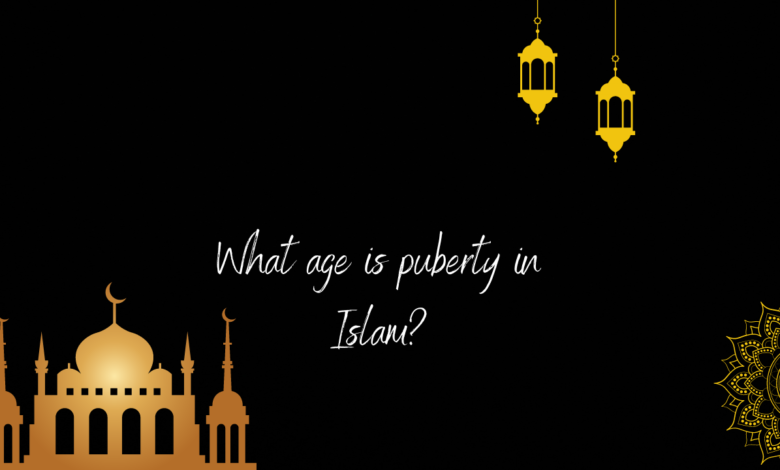What age is puberty in Islam?

Introduction
Puberty is a significant phase in a person’s life, marking the transition from childhood to adulthood, and it holds cultural, religious, and social importance across various societies. In Islam, puberty is a crucial milestone that signifies a person’s moral and legal responsibilities within the religion. Let’s delve into the concept of puberty in Islam, its significance, and the implications it carries.
Nature and Significance of Puberty:
Puberty is the stage of physical and psychological development during which a child’s body matures into an adult one, enabling them to engage in reproductive functions. This transformation encompasses hormonal changes, growth spurts, and the development of secondary sexual characteristics such as facial hair (in males), breast development (in females), and changes in voice pitch. Beyond the biological aspects, puberty also signals cognitive and emotional shifts as individuals grapple with their evolving identities.
Age of Puberty in Islam:
In Islamic jurisprudence, the age of puberty, or “bulugh,” is when an individual becomes morally and legally accountable for their actions and is expected to fulfill religious obligations. However, there is no fixed age specified in the Quran or Hadith (sayings and actions of Prophet Muhammad) for the onset of puberty. Instead, the age of puberty varies among individuals and is generally associated with the appearance of specific physical signs.
Physical Signs of Puberty:
Islamic scholars have highlighted certain physical signs that indicate the onset of puberty:
Males: The most commonly referenced sign for males is the emergence of facial hair. While this is not a universal marker, it is often taken as an indicator of reaching the age of puberty in Islamic tradition.
Females: For females, the onset of menstruation, or “hayd,” is considered a clear indicator of puberty. This marks the beginning of a woman’s reproductive capabilities and her moral and legal responsibilities within the faith.
It’s important to note that the age at which these signs appear can vary widely based on genetic, environmental, and nutritional factors.
Moral and Legal Responsibilities:
Upon reaching puberty, individuals in Islam are considered “mukallaf,” meaning they are morally and legally responsible for their actions and are held accountable in the eyes of God. This responsibility entails fulfilling the Five Pillars of Islam – declaration of faith (Shahada), prayer (Salat), charity (Zakat), fasting (Sawm) during Ramadan, and pilgrimage (Hajj) for those who are financially and physically able.
Educational and Emotional Support:
Islam encourages a supportive and nurturing environment for individuals undergoing puberty. Parents, guardians, and religious leaders are advised to provide guidance, education, and emotional support to help young people navigate this transformative phase. Open communication about the changes they are experiencing and their new religious responsibilities can aid in their understanding of Islam’s expectations.
Cultural Variations:
While the core principles of puberty in Islam remain consistent, cultural interpretations and practices can influence how this phase is perceived and celebrated. Cultural norms and customs might affect the way families and communities approach discussions around puberty, the age at which certain rituals are performed, and the level of emphasis placed on the religious responsibilities associated with it.
In Conclusion:
The age of puberty in Islam is not rigidly defined by a specific numerical age but is instead marked by significant physical changes that indicate an individual’s readiness to take on religious and moral obligations. This pivotal phase underscores the interconnectedness of biological development and spiritual responsibility. Islam emphasizes the importance of providing education, guidance, and emotional support to individuals as they navigate the transition to adulthood, ensuring they understand and embrace their religious duties while maintaining a strong connection with their faith.
FAQs about Puberty Age in Islam
What is the age of puberty according to Islam?
In Islam, puberty is typically considered to begin once a child reaches the age of maturity, which is generally around 9 lunar years for girls and 12 lunar years for boys.
What is the significance of puberty in Islam?
Puberty is a significant milestone in Islam, as it marks the transition from childhood to adulthood. It’s a time when individuals become morally and legally responsible for their actions and are obligated to fulfill religious duties like daily prayers and fasting during Ramadan.
Is there a difference between boys’ and girls’ puberty ages in Islam?
Yes, Islamic tradition generally indicates that girls reach the age of puberty earlier than boys. Girls are considered to reach puberty around the age of 9 lunar years, while boys around 12 lunar years.
How is puberty determined in Islamic teachings?
Puberty in Islam is determined based on physical signs, such as the onset of menstruation for girls and the development of facial hair and a deepening voice for boys.
Can puberty age vary among individuals in Islam?
Yes, puberty onset can vary among individuals due to factors like genetics and environmental influences. Islam acknowledges this variability and emphasizes the physical signs of maturity as the determining factor.
What religious obligations change after reaching puberty?
After reaching puberty, individuals are required to perform the obligatory acts of worship, such as daily prayers (Salah), fasting during Ramadan (Sawm), giving alms (Zakat), and if possible, undertaking the pilgrimage to Mecca (Hajj).






